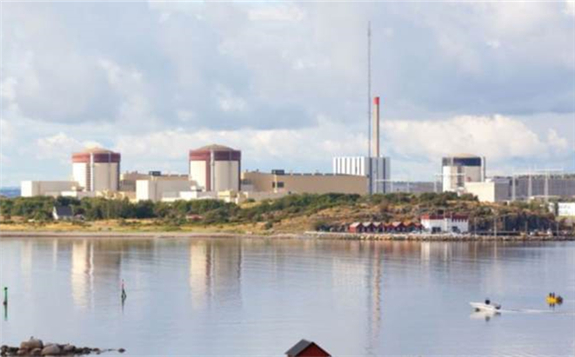Ringhals AB - operator of Sweden's Ringhals nuclear power plant - has entered into an agreement with national electricity transmission system operator Svenska Kraftnät (SvK) regarding the availability of unit 1 at the plant. The agreement aims to secure the voltage stability and short-circuit power in the transmission network to handle the operating situation in southern Sweden during the summer.
 The four-unit Ringhals plant (Image: Vattenfall)
The four-unit Ringhals plant (Image: Vattenfall)
Ringhals 1 is scheduled to shut permanently by the end of this year. Ringhals unit 2 closed down in December 2019 following a 2015 decision to close the reactors five years earlier than originally planned, for commercial reasons. Unit 1 is currently in a maintenance outage, which began on 13 March. Vattenfall - owner of a 70.4% stake in the Ringhals plant - informed the Nordpool power exchange on 31 March that the 910 MWe boiling water reactor would remain off line until after the summer due to the current market prices of electricity. The reactor would then be operated until the end of the year when it will be permanently shut down.
However, under an agreement announced on 18 June with SvK, Ringhals AB will now ensure the availability of power to the grid over the summer months. Under the agreement, the two turbines at Ringhals 1 must be constantly phased in and make their reactive capacity available during the contract period from 1 July to 15 September. The unit was subsequently resynchronised to the grid on 27 June.
"During the summer, the margins are smaller and in order to deal with disruptions and unforeseen events, measures are needed to improve the ability to deal with the errors that arise," SvK said in a statement. "The additional measures that Svenska Kraftnät is now taking are related to voltage stability and short-circuit power in southern Sweden." It added the purpose of the agreement with Ringhals AB is "to ensure voltage stability and short-circuit power, capacities that are important for power system operation and which cannot be secured through existing market solutions."
Torbjörn Wahlborg, Vattenfall's production manager, said one of the strengths of nuclear power is its predictability. "Nuclear power has a stabilising effect on the electricity grid with a predictable power supply and not the least ancillary services such as voltage control and inertia," he said. "This spring has resulted in very high water flows in hydropower and long periods of windy conditions. At the same time, the electricity grid needs a significant proportion of predictable power generation that does not fluctuate with rain or wind. When we got the request from SvK to provide stabilizing services to the grid we obviously wanted to make an effort to help. Therefore we have now agreed with SvK to restart Ringhals 1 early to provide stability to the grid."
Vattenfall noted that deciding at short notice to restart Ringhals 1 earlier than expected has consequences for personnel and resource planning. "Ringhals must pay special attention to how it can affect the operation and maintenance of other reactors, as well as the upcoming decommissioning work of Ringhals 1 and 2," the company said. "But Vattenfall's employees have worked all spring to maintain stable operation and secure electricity supply in the middle of the corona pandemic and will also work to solve the task of starting Ringhals 1 earlier."
World Nuclear Association Director General Agneta Rising commented: "Nuclear reactors are not only the unsung heroes in the climate debate, but also the unseen pillars of the electricity systems, upon which we rely on by generating immense amounts of electricity around the clock, irrespective of the weather or season. Over the last few days the importance of providing these essential services, unique amongst the low-carbon electricity generators, has become ever more noticeable. The nuclear industry should be proud of the key part it plays in safeguarding our modern society, and I am personally very proud of the Ringhals nuclear power plant and its workers - the very same power plant where my nuclear career began."